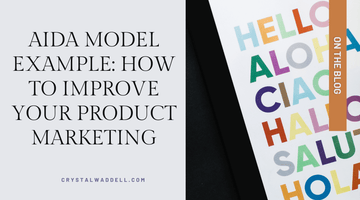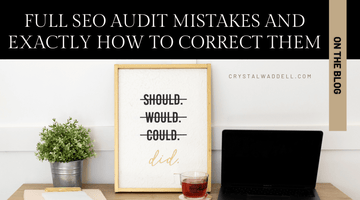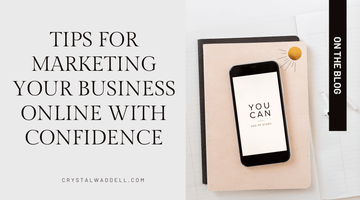The Hidden Psychology of SEO Success Transcript:
Episode 2: Mindset and SEO
Welcome to the Simple and Smart SEO show. I'm Brittany Herzberg, a copywriter for healthcare providers who loves Instagram.
And I'm Crystal Waddell, a Shopify seller with a heart for Pinterest.
We're business besties and social media mavens who love learning and sharing what we've learned.
This is a podcast that makes SEO simple and shows you how to create a smart SEO strategy that works for your business.
What are we waiting for? Let's jump in.
Hey, welcome to our episode all about SEO mindset. Of course, I'm here with B.
So B, why don't you kick us off? Like what did you initially think about seo?
Oh my goodness.
First of all, I'm so excited about this episode because I feel like a lot of people have a lot of thoughts and a lot of feelings about SEO, and I'm excited to share our own ups and downs with it.
Initially, SEO just, I wanted to learn more.
Everyone that I talked with made it sound really complicated and really expensive, and I thought it could really help with my marketing efforts, but I just didn't know anything, so I just wanted to learn more.
Of course, in true Brittanyy fashion, I was like, Let me gather all the knowledge.
Well, I think what you said is so right.
SEO seemed like one of those things that you had to have an agency on board or some sort of major technical knowledge or resource to get it done.

It just, for me, it didn't seem like it was even attainable or something that I could, I could try on my own.
Did you feel like that?
Definitely, yeah, I definitely felt like that. I
was like, Okay, maybe I'll see if I can, I mean, I definitely went into it with more of a, let's see if I can figure this out on my own with the resources available online.
To your point, I wasn't really sure.
That's what I realized once I actually heard what SEO meant, search engine optimization, and I learned that it was really just powered by keywords.
And what else is powered by keywords? My favorite platform, Pinterest.
So when I realized, I was like, Oh my gosh, this is just like Pinterest, it's like writing pin descriptions only for your website.
Then I learned about meta descriptions and page titles and all that type of stuff and how that shows up in search.
And, just the fact that all you have to do is just write a headline that relates to whatever it is that you're selling or talking about, and a short description that kinda helps you get people's attention.
And I realized it was just, it was very similar to Pinterest.
And so, the final like aha that I had once I realized, Oh my gosh, I might be able to do this SEO thing, was, this is the missing piece to everything that I had learned.
You're told to have social media, have a website and have all this stuff, but nobody really talks about how to get people on your website pages.
To the place where they can connect with you and buy your product.
And SEO was that missing piece.
You mentioned something a little bit ago.
You said something and it's three letters and I don't really know what it is.
Do you still have people asking you what it is? I
did have a client the other day who said she was looking for someone to maybe do some stuff with her website and social media.
And I think when people say, I want someone to do something with my website, I think those are the words that they're using to say, I want some search engine optimization for my website.
They just don't know what it's called.
Essentially what they're saying is, I want people to be able to find my business online. The definition of that is search engine optimization.
That's a really interesting point.
That is, that is you, it sounds like you're right. Barking up the right tree.
So I don't know if this is helpful or if this will help anyone listening, but my easy way to explain it recently has been saying that SEO search engine optimization is what helps you and your website show up as the answer to a Googled question.
And that seems to follow, or that seems to be followed up more with curiosity than confusion.
So that's really exciting. I have a mentor, Marisa Corcoran, and she always talks about, as you introduce what you do and what your business is, is it followed up by confusion or by curiosity?
So that's been definitely getting more curious people, but I'm sidetracking us a little bit.
Oh, no, I love that. I love that.
So, I mean, honestly, I think it's a nice segue because the next thing I wanted to ask you was like, what's been your biggest challenge when it comes to seo?
Oh my gosh. I think for me it's been just wanting to do everything at once.
And again, in my typical ways, wanting to help everyone else and bring everybody along with me, it's like how you and I are always on phone calls or texting or emailing.
We're constantly talking and it's like, Did you learn this? Did you know this?
And we're always sharing with each other so that we can pull each other along or like help each other boost each other,
Whatever word we need to throw in there.
But I think that's something that you and I definitely have in common, and it's something that we've bonded over is, and that's why we have this podcast.
Because we want to be able to say, Hey, look, did you know this thing?
This is how you can do it. And it's gonna take you a little bit of time, but once you get in the rhythm of it, it'll go faster and you'll see results.
And it's just really fun to share that with other people. just to your point of like trying to pull people along, I'm, I'm like, Oh, you've got, you've gotta try this thing, this SEO thing.
And it's like, that sounds hard, you know? Like, that sounds like it's gonna take a long time.
I don't think I will do that. I just wanna, I just wanna post on social media, so…
Well, and to your point, a lot of people, we don't put it first because we don't understand how important it is.
And it, while it's never too late, it's also not too early because seo, we've talked about a little bit about this before, SEO needs time.
So if you can do it early on or pretty early on when you're getting your business online, it's gonna help you, It's gonna help your business.
And to tie in the social media piece, social media does kind of just live in its own little bubble,but there are some SEO aspects, which we’re (teaser) gonna get into in the next couple of episodes of how you can actually optimize those platforms to tie in with your SEO strategy.
So everything's connected. And I feel like social media is an extension of an SEO strategy.
Yeah. Great way to put it.
Like, Yeah, because first I thought it was the starting point, like that's the starting point.
Everything in my business extends from that.
But it's like, no, no, no, no. Everything should start on our website.
Everything should start with optimizing our website and then extend out from there.
And the biggest challenge for me has just been kind of managing all of the moving parts, because SEO is like everything else in online business.
It's like once you learn about one thing, like five more heads pop up and say, Hey, what about me? Learn about me?
It's like, Oh my gosh, you know?
Take a deep breath and do one thing at a time and keep track of what you're doing as you're doing it.
So you know where to start next when you can pick it up again.
Yeah.
And that actually ties into another good question. So as you're noticing all these side things popping up, are there any tactics that you've found to be super effective with SEO for your Business?
One thing that's really helped is Google my business.
And Google my business has been a big one, and I've done Google my business for a long time, probably for the last few years.
And I never realized how much it actually was helping my website.
It was the one really quality link that I had, because I guess over the years, like even links out to your social media and stuff have lost the link juice or the power that they once had.
But Google my business obviously is a Google product.
It's been so helpful because I can post updates there and I can post photos there.
And I see that listing and the Google my business information I'm putting on there is actually driving traffic back to my website.
So it's one of those things that doesn't seem very fun, like,Google my business, what is that?
People call it GMB in the SEO world, but it's been a really, really effective way to get attention, utilize Google's products and drive people back to my shop.
That is really smart.
I definitely do not pay enough attention to my Google My Business account, which I have more for my massage therapy practice in Apex.
But I, I should somehow segue that over into copywriting and SEO copywriting that I do for people.
That's a really good reminder.
Thank you, Crystal. Yeah, You're welcome.
And so there, that's the, that's the e-commerce side.
Tying in, everything keyword research, the most important thing that's been the most effective, and just some most eye-opening, in terms of like, the opportunities for my business.
So what do You think the most impactful tactic that I've run across has been?
Making sure that every single page on my website has an SEO title and description.
It was an easy thing to go back and do and modify, and it's something that I can, as I write new blogs or as I put out new webpages, I'm able to quickly go through.
And now that I have done the research and I have the strategy in place, I can go in and add those pretty easily.
What about this, Like, have you ever had any problems implementing this strategy?
As you started working on SEO with your website and, making sure that every single page has an SEO title and description, have you had any issues?
Yeah, I wouldn't say problems necessarily, but the way I looked at it, I had some missed opportunities, things that I just didn't know about before I started looking into delving into the world that is seo.
So I felt like I had to backtrack a little bit and redo some things on my site.
For example, I needed to rename some images, change up some image titles. I didn't have the dashes in there. I had 10 words instead of, now I like to use three to five words and a select few of my URL slugs.
I went back and, and renamed, modified, we'll get into that I'm sure in a future episode, but there were some select URL slugs that I chose to do that with.
And I just, my brain circled back to the tactic and effective tactic.
When you mentioned keyword research, there's something that I discovered not too long ago,and I love looking at it when you do a Google search with a term.
So if you, if you guys wanna try this, you head to Google, you type in the search bar, like if I put healthcare copywriter, you search.
And then there's a section that says people also ask, and it looks like a dropdown FAQ box area.
My gosh, if you can write articles or if you can write social media captions answering those questions, that's been one of the biggest, most effective tactics for my business has been paying attention to that.
So I just wanted to tie up that loose end. Yeah.
And from an SEO like search perspective, that is a genius way to get traffic, because that's what Google wants to do.
And any search engine functions as the resource to answer a query or a question as quickly as possible.
So if you are, if your article or whatever text you have answers that question, then you become a trusted resource for Google, to be able to answer that question quickly.
And it's another place to be able to show up in those search engine results pages, what people call SERPS.
There's 10 top search results on that first page, but then you also have the image results, and you have those people also ask results.
And so if you can show up there, that's a great place, to be found because it's like, that looks like you're endorsed by Google in a way, you know?
Right, definitely.
So that's, yeah, a really great extension of credibility to show up as an answer to a question.
Yeah. I mean, it's a fantastic and oft overlooked little section of that search page.
So that's definitely like a win. Is there any kind of problem that you've had with your SEO strategy implementation?
Like, Gosh, where do I start?
Like I said, first of all, just learning about SEO and then trying to incorporate a functioning list of to-dos and what's been done, what needs to be done better.
And I made one of the greatest errors that you can make in an e-commerce store with my Shopify site, and that was by duplicating product pages.
So by duplicating product pages, I thought I was saving time because I already had my descriptions and da da, da.
A lot of things that are similar. And duplicate content is not looked upon favorably by Google, so you wanna avoid that.
And then also, what I didn't realize was duplicating was the page titles and the meta descriptions. Yeah.
And so, I've spent a lot of time going back and sifting through all of that and writing new titles and new descriptions and, and at the same time, also trying to infuse the keywords that I found into the titles.
And so it's just, it kind of gets messy in that way.
Those are just things that really have shown me like, okay, I've gotta come up with a very strategic way of implementing changes and documenting those changes that way, I'm not making more work for myself down the road.
So e-commerce versus a service provider or even a blogger, there are different SEO tactics and different SEO focuses for different types of businesses, but they do share some similarities, and that's what I've enjoyed most, which is connecting the dots between all of them.
Definitely. Yeah. So I just wanna take a quick pause and, we're tying this all into mindset, right?
So as you can tell, we're doing a lot of our SEO work.
We're doing the research, the strategy, the implementation.
How did you feel as you're recognizing, Oh no, I missed this, I gotta go back and change it, or, Oh, I goofed on this.
How did you feel at that moment?
Do you remember?
Well, I think anytime I realize I've made a big mistake, or I've wasted a lot of time, I go through lots of emotions and that first emotion is like anger, you know?
Yeah.
At myself, frustration, I wanna quit, like, yeah, oh, probably pops in there for a minute,
I should give up. This is so horrible. It's one of those things that I'll never be able to do.
I don't know what that emotion is, but those are the types of thoughts that go through my head.
So I go to a pretty low place anytime I fail, but then I realize like, okay, this is an opportunity here, knowing that you've done things wrong.
And, and for me personally, like saying, Okay, I've done these things wrong.
It's actually always the best teacher, it's always the best way to learn.
This is a way not to do it, and here's a better way to do it.
So, you can't go back and change things, but moving forward, you can definitely work smarter.
And so that always makes me feel good. So then I bounce from that really low place to a really high place that I'm like, Look how much I've learned, You know?
So, Yeah.
What about You?
Everything you said, I was just kind of picturing myself as just like an animated cartoon character, just like literally throwing in the towel and stomping off into the sunset and then coming back to fix everything up.
But yeah, everything you said, you, you get really sad and disappointed and frustrated and think it's the end of the world, and then you're like, Oh, okay, I can see the light at the end of the tunnel.
This is how I get there.
So how, how do you make that work, in your business, like your day to day?
I mean, how does SEO fit into what you're doing?
Yeah, I guess I mentioned it a little bit earlier with coming up with blog ideas for my website or coming up with social media captions, and even the titles for those things.
I really try to reference the SEO keywords and the strategy that I have so that I implement them in a smart way.
But I really try to work in as much as I can, figuring out how to title the images better.
And as I, like you were talking about as we move forward, making smarter and better decisions with titling things, creating things, designing things, even like the URLs, just knowing how to do that moving forward.
Any opportunity. I see, I'm jumping on it pretty much.
What about You?
The most important thing that I've learned so far is just like, documentation is so important, you know?
Yeah.
And so, like, the first thing that I've created is kind of a walkthrough for Shopify store owners and how to develop their own custom SEO strategy for their business because there's no one size fits all for every business.
And you have to know your capacity. And then also, if you have the finances to outsource it to someone, that could be a great solution too, but just having a plan, kind of a roadmap, and then understanding the different moving pieces of it.
Like titles, product titles, collection titles, alt text, meta descriptions, blogs, on page copy, and really utilizing keyword research.
And then also internal linking, you know? Yeah.
Because that is the number one thing that people have the most control over, is connecting the dots on your own website to show Google how to crawl your website and how things are related.
So, those are, those are really, really important.
And I think those are great topics for the future, too, because I, I was just thinking that, I mean, you talked about alt text, you talked about page slugs and those type of things, and people might be like, What is that?
A dictionary episode where we just go through, actually Yeah. All these terms.
Yeah. Wouldn't that be fun just to kind of figure out what exactly these weird words are, you know?
That would be good. I also wanna make sure, I'm sure we can link that template you were talking about for Shopify store owners and Oh, yeah.
Maybe we can also link the resource I created, I've created it mostly for service based businesses. I call it a one stop cheat sheet, and you can just plug in all of your SEO components in there.
It links out for how you can do research. It links out for how you can, a tool to help you write your SEO title and meta description. So let's link both of those in the notes for sure. It doesn't have to be complicated.
I guess that's the biggest thing I wanna get across to, to everyone, is like, it does not have to be complicated. You can do it. You got this. Okay. Well, awesome.
This was super fun. This was episode number two, so we hope you enjoyed it. Yep. And we'll be back.
What are we talking about next?
I think we're doing Pinterest next time, and then Instagram or maybe Instagram and then Pinterest.
But yeah, get ready for social.
Okay.
Buckle up. Yeah.
All right. Okay, guys, thanks for joining us today. We, we appreciate you being here, and we will catch you next time, right?
If you like this info, subscribe before you go so you never miss out on something related to seo. See you next time.
Frequently Asked Questions: SEO Mindset
What are the 5 important concepts of SEO?
-
Keyword Research: Identifying the right keywords to target is essential for any SEO strategy. You need to find terms that have enough search volume to be worth targeting, but aren’t so competitive that you can’t rank for them.
-
On-Page Optimization: Once you’ve targeted a set of keywords, it’s important to optimize your content and website around them. This includes using the correct keyword density, optimizing your title tag and meta description, and adding relevant internal links.
-
Link Building: In order to rank well in search engines, you need links from other websites pointing back to your content. This process is known as link building, and there are a number of methods you can use to get high-quality links, such as guest blogging and directory submissions (and adding internal.
-
Social Media Marketing: Social media is another important factor in SEO. By promoting your content on social media sites, you can increase the reach of your content and build links back to your website.
-
Monitoring and Tracking: Finally, it’s important to monitor your SEO progress and track your rankings. This will allow you to see the effects of your efforts and make necessary adjustments to your strategy.









